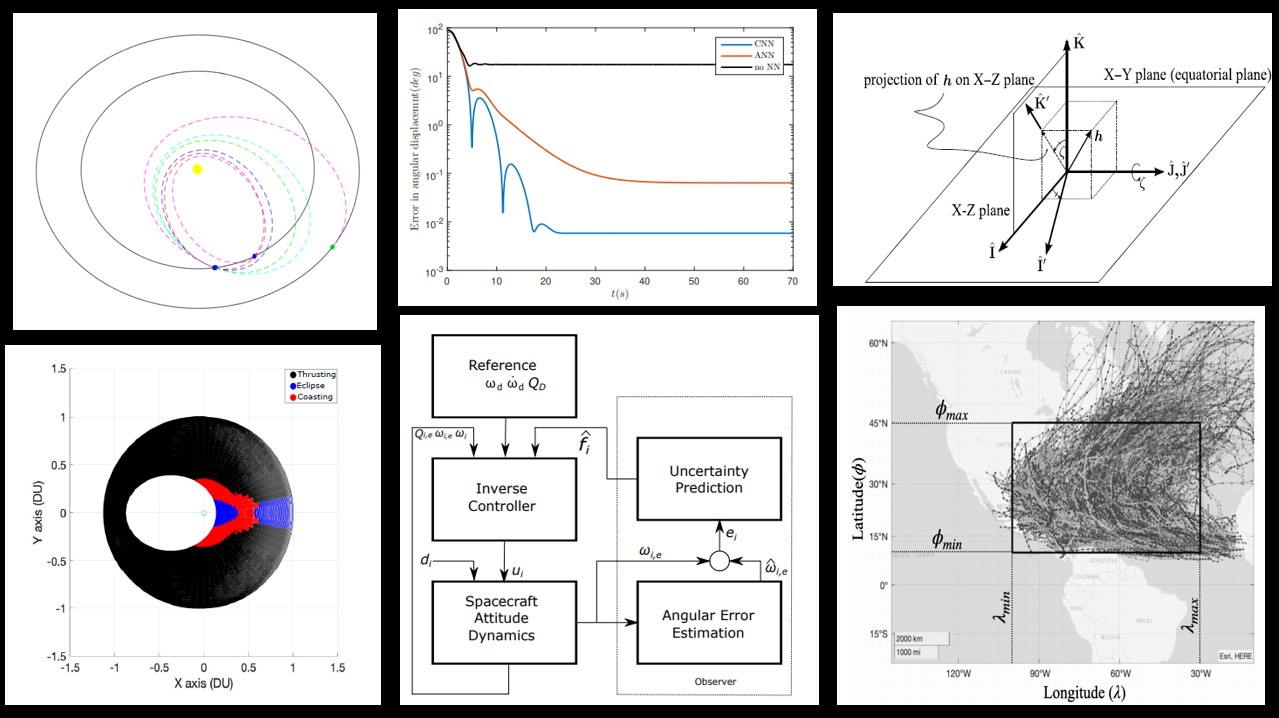Doctoral Students
If you are interested in pursuing a doctor of philosophy (Ph.D.) degree in the area of astronautics, please review the program requirements for Ph.D. in aerospace engineering. In addition to meeting the institutional and departmental requirements for application, the prospective candidate should send a statement of research and should arrange for 2-3 letters of recommendation; these additional materials need to be sent by email directly to Dr. Atri Dutta. Doctoral students working in the laboratory typically specialize in the area of flight dynamics and control, with their dissertation focused on space applications.
Doctoral students have typically been supported by federally-funded grants and/or internal WSU funding. Graduate research assistantships are competitive and offered to students with excellent academic and research background. Prospective doctoral students are recommended to consider student funding opportunities available from external agencies to support their doctoral dissertation work, such as the ones listed below:
NASA Space Technology Graduate Research Opportunities (NSTGRO)
Future Investigators in NASA Earth and Space Science and Technology (FINESST) Program
NSF Graduate Research Fellowship Program (GRFP)
DoD National Defense Science and Engineering Graduate (NDSEG) Fellowship Program
AE-707 Modern Flight Control Systems Design I
AE-714 Advanced Flight Dynamics I
AE-715 Intermediate Space Dynamics
AE-718 Nano-Satellite Engineering
AE 759 Neural Network Models for Control
AE-773 Intermediate Dynamics
AE-807 Modern Flight Control Systems Design II
ECE-711 Optimization Techniques for Cyber-Physical Systems
ECE-884 Stochastic Controls
ECE-885 Robust Control Systems
ECE-893 Optimal Control
MATH 757 Partial Differential Equations for Engineering
Masters Students
If you are interested in pursuing a master of science (M.S.) degree in the area of astronautics, please review the program requirements for M.S. in aerospace engineering. Masters students working in the laboratory typically specialize in the area of flight dynamics and control, with their thesis focused on space applications. The thesis option is recommended for all full-time students. Part-time students working in the local industry often pursue the directed project option. In some instances, masters students, pursuing the thesis option, have been supported by federally-funded grants. Information about current and former masters students are available here.
Please meet all relevant criteria set by the AE department for MS Thesis students. Additionally, in order to schedule a thesis defense, students should have contributed substantially to a published/accepted journal paper (full-length or engineering note).
Please meet all relevant criteria set by the AE department for MS Directed Project students. Additionally, In order to schedule a directed project presentation, students should have contributed to a published/accepted journal paper (full-length or engineering note).
In order to satisfy the departmental criteria of applied learning experience for coursework-only MS program, students will need to work on a small project, typically of the duration of 6-8 weeks. The project will be in the area of astrodynamics and/or control systems.
Astrodynamics focused applied learning
Students who have successfully completed AE-715 course on Intermediate Space Dynamics, with a grade of B or better, are eligible for the applied learning opportunity.
Control focused applied learning
Students who have successfully completed AE-807 course on Modern Flight Control System Design II, with a grade of B or better, are eligible for the applied learning opportunity.
AE-707 Modern Flight Control Systems Design I
AE-714 Advanced Flight Dynamics I
AE-715 Intermediate Space Dynamics
AE-718 Nano-Satellite Engineering
AE 759 Neural Network Models for Control
AE-773 Intermediate Dynamics
AE-807 Modern Flight Control Systems Design II
ECE-711 Optimization Techniques for Cyber-Physical Systems
ECE-884 Stochastic Controls
ECE-885 Robust Control Systems
ECE-893 Optimal Control
MATH 757 Partial Differential Equations for Engineering
Undergraduate Students
If you are interested in pursuing an undergraduate bachelor of science (B.S.) degree in the area of astronautics, please review the program requirements for B.S. in aerospace engineering. There are a number of ways an undergraduate student may engage in astronautics research. Previous students have leveraged the following programs at WSU for the purpose:
- First-year research experience (FYRE) in STEM program
- College of engineering undergraduate research experience program
- WSU NASA jumpstart program (JSP)
In some instances, undergraduate students have been supported by grants, federal or state.


